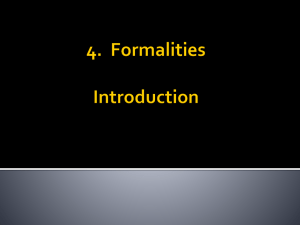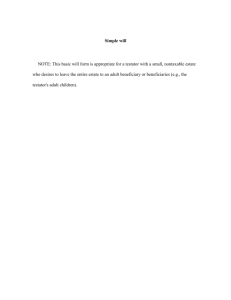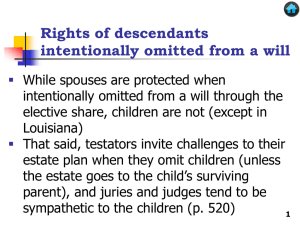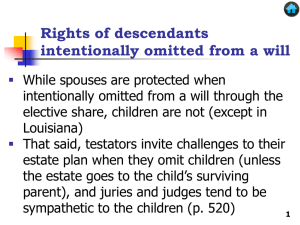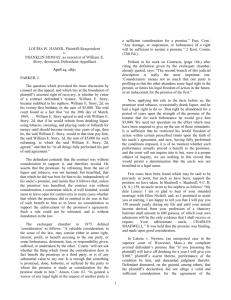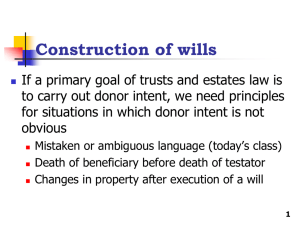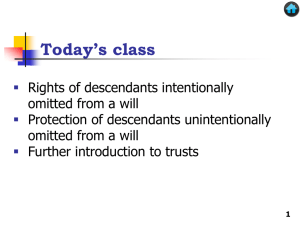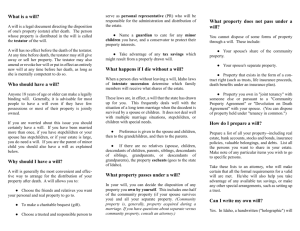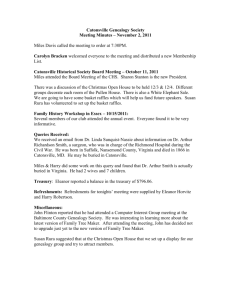LOUISA W. HAMER, Plaintiff-Respondent v. FRANKLIN SIDWAY, as
advertisement
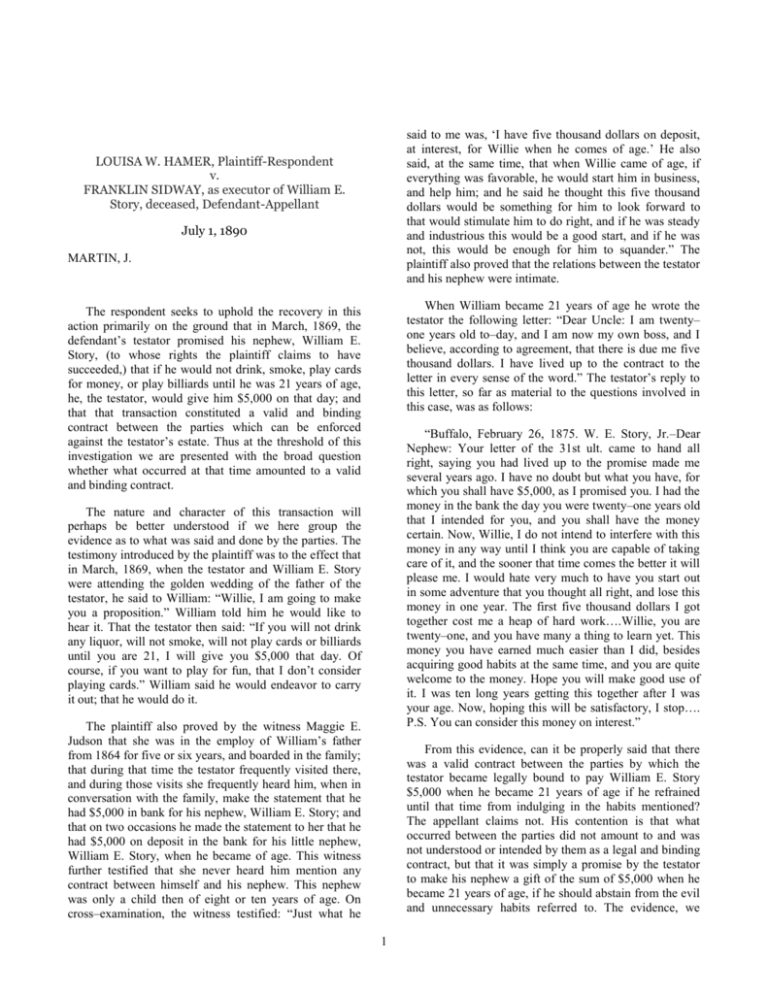
said to me was, ‘I have five thousand dollars on deposit, at interest, for Willie when he comes of age.’ He also said, at the same time, that when Willie came of age, if everything was favorable, he would start him in business, and help him; and he said he thought this five thousand dollars would be something for him to look forward to that would stimulate him to do right, and if he was steady and industrious this would be a good start, and if he was not, this would be enough for him to squander.” The plaintiff also proved that the relations between the testator and his nephew were intimate. LOUISA W. HAMER, Plaintiff-Respondent v. FRANKLIN SIDWAY, as executor of William E. Story, deceased, Defendant-Appellant July 1, 1890 MARTIN, J. When William became 21 years of age he wrote the testator the following letter: “Dear Uncle: I am twenty– one years old to–day, and I am now my own boss, and I believe, according to agreement, that there is due me five thousand dollars. I have lived up to the contract to the letter in every sense of the word.” The testator’s reply to this letter, so far as material to the questions involved in this case, was as follows: The respondent seeks to uphold the recovery in this action primarily on the ground that in March, 1869, the defendant’s testator promised his nephew, William E. Story, (to whose rights the plaintiff claims to have succeeded,) that if he would not drink, smoke, play cards for money, or play billiards until he was 21 years of age, he, the testator, would give him $5,000 on that day; and that that transaction constituted a valid and binding contract between the parties which can be enforced against the testator’s estate. Thus at the threshold of this investigation we are presented with the broad question whether what occurred at that time amounted to a valid and binding contract. “Buffalo, February 26, 1875. W. E. Story, Jr.–Dear Nephew: Your letter of the 31st ult. came to hand all right, saying you had lived up to the promise made me several years ago. I have no doubt but what you have, for which you shall have $5,000, as I promised you. I had the money in the bank the day you were twenty–one years old that I intended for you, and you shall have the money certain. Now, Willie, I do not intend to interfere with this money in any way until I think you are capable of taking care of it, and the sooner that time comes the better it will please me. I would hate very much to have you start out in some adventure that you thought all right, and lose this money in one year. The first five thousand dollars I got together cost me a heap of hard work….Willie, you are twenty–one, and you have many a thing to learn yet. This money you have earned much easier than I did, besides acquiring good habits at the same time, and you are quite welcome to the money. Hope you will make good use of it. I was ten long years getting this together after I was your age. Now, hoping this will be satisfactory, I stop…. P.S. You can consider this money on interest.” The nature and character of this transaction will perhaps be better understood if we here group the evidence as to what was said and done by the parties. The testimony introduced by the plaintiff was to the effect that in March, 1869, when the testator and William E. Story were attending the golden wedding of the father of the testator, he said to William: “Willie, I am going to make you a proposition.” William told him he would like to hear it. That the testator then said: “If you will not drink any liquor, will not smoke, will not play cards or billiards until you are 21, I will give you $5,000 that day. Of course, if you want to play for fun, that I don’t consider playing cards.” William said he would endeavor to carry it out; that he would do it. The plaintiff also proved by the witness Maggie E. Judson that she was in the employ of William’s father from 1864 for five or six years, and boarded in the family; that during that time the testator frequently visited there, and during those visits she frequently heard him, when in conversation with the family, make the statement that he had $5,000 in bank for his nephew, William E. Story; and that on two occasions he made the statement to her that he had $5,000 on deposit in the bank for his little nephew, William E. Story, when he became of age. This witness further testified that she never heard him mention any contract between himself and his nephew. This nephew was only a child then of eight or ten years of age. On cross–examination, the witness testified: “Just what he From this evidence, can it be properly said that there was a valid contract between the parties by which the testator became legally bound to pay William E. Story $5,000 when he became 21 years of age if he refrained until that time from indulging in the habits mentioned? The appellant claims not. His contention is that what occurred between the parties did not amount to and was not understood or intended by them as a legal and binding contract, but that it was simply a promise by the testator to make his nephew a gift of the sum of $5,000 when he became 21 years of age, if he should abstain from the evil and unnecessary habits referred to. The evidence, we 1 think, shows that such was the nature and effect of that transaction. unqualifiedly that he does not intend to interfere with this money in any way until he thinks William capable of taking care of it. The promise of the testator, as testified to by the plaintiff’s witnesses, was that if his nephew would refrain from smoking, drinking, and gambling, during his minority, he would give him $5,000 on the day he became of age. It will be observed that this promise was not that he would pay him that amount for any service to be performed for the testator, but that he would give him that amount as a gratuity, as an incentive to his nephew to become a sober and worthy man, free from evil and useless habits. In its ordinary and familiar signification, the word “give” means to “transfer gratuitously,” without any equivalent. Presumably the word was used in that sense by the testator. Unless the evidence shows that it was used in some other sense, its ordinary signification should be given it. Thus the testator, instead of recognizing any legal liability to pay the money when William became 21 years of age, treated the matter just as he doubtless understood it, as a promise to make a gift at that time, and he then in effect refused to perfect the gift by delivery, but insisted upon retaining it under his own dominion and control until he should think William capable of taking care of it. When this letter was received by William, the evidence fails to show that he objected to it, or claimed that he had any right to the money until such time as the testator should see fit to give it to him. This evidence is inconsistent with the existence of a valid contract, and consistent only with the appellant’s theory that this transaction was a mere promise to make a gift, and that both parties so regarded it. We find no sufficient evidence in this case to hold that the word “give” was used other than in its ordinary sense. The evidence of the witness Judson shows that when Willie was a child only eight or ten years of age the testator contemplated making him a gift of that sum when he became of age, and that he frequently mentioned his purpose in the family of his brother; and that he also contemplated starting him in business at that time, if everything was favorable. Thus the purpose of the testator would seem not to have been a new one arising at that time, but one which had existed for years, and which was known to the family. This witness also testified that this contemplated gift was not only a subject of frequent conversation between the testator and his brother’s family, but that he conversed with her in relation to it upon at least two occasions, and still she never heard anything about any contract between the testator and William. This testimony tends to sustain the appellant’s claim that the arrangement between the parties was in the nature of a promised gift by the testator. We think the transaction between the testator and William E. Story amounted to no more than a promise on the part of the testator that he would give William $5,000 when he became 21 years of age, if he should prove himself worthy of it by abstaining from certain useless, evil, and expensive habits…. If, however, it could be held that the transaction between the testator and William E. Story was intended by the parties as a valid agreement by the testator to pay his nephew $5,000 to induce him to abstain from smoking, drinking, and gambling, until he was 21 years of age, still, it would be very difficult to discover any sufficient consideration to uphold such an agreement. There was doubtless a motive for this promise, but was there a consideration? There are many motives, which may induce an agreement which do not furnish sufficient consideration to uphold it. It may be that the testator was morally bound to keep his promise; but a gratuitous promise, not under seal, however strong may be the motives, or even the moral duty, on which it rests, will not be enforced by courts of justice. The doctrine that a moral obligation may become legally binding through an express promise, though formerly held in England and in the United States, has since been generally repudiated, except in Pennsylvania. That doctrine now forms no part of the jurisprudence of this state. But it may be said that the correspondence between the parties when William became of age tends to show that the arrangement was as claimed by the respondent. It is true that William, in his letter to the testator, refers to the arrangement between them as an agreement or contract, and states that he believes there is due $5,000, but in the testator’s reply to that letter he mentions the $5,000 only as a sum which he had promised to his nephew. In this letter there is nothing reflecting any light upon the original transaction which shows that the testator recognized any legal liability or binding contract upon which he regarded himself as indebted to his nephew. On the contrary, the testator’s letter is inconsistent with that idea; for, after stating that he had the money in the bank that he intended for him, (William,) and after he again promised that he should have it, the testator states Only a valuable consideration will uphold an executory contract. The consideration must be something of value, something either beneficial to one party or disadvantageous to the other, in a pecuniary sense. How can it be said that William E. Story has performed any act which was in any pecuniary sense either beneficial to the testator or disadvantageous to himself by abstaining from habits which would have been not only expensive, but 2 which were unnecessary and evil in their tendency? The only case cited by the respondent which tends to give the slightest countenance to the doctrine contended for is that of Shadwell v. Shadwell, 9 C. B. (N. S.) 169, but that case is clearly distinguishable from this. The decision in that case may well be sustained upon the ground that the plaintiff made a material change in his position, and incurred additional pecuniary liabilities. While in the case cited it might be said that the nephew changed his position by his marriage, and thus incurred additional pecuniary liabilities at the request of his uncle, such is not the case at bar. If the nephew in this case changed his position by abstaining from expensive habits which could in no way benefit him, it did not in any way add to his pecuniary liability, but could only have resulted to his pecuniary benefit. We doubt if there was any sufficient consideration to uphold an agreement between the testator and his nephew, even if the transaction between them were to be regarded as such…. We are … of the opinion that there was no legal contract between the parties sufficient to uphold the recovery in this case, and that the judgment should be reversed. Judgment reversed, and a new trial granted, with costs to abide the event. 3
